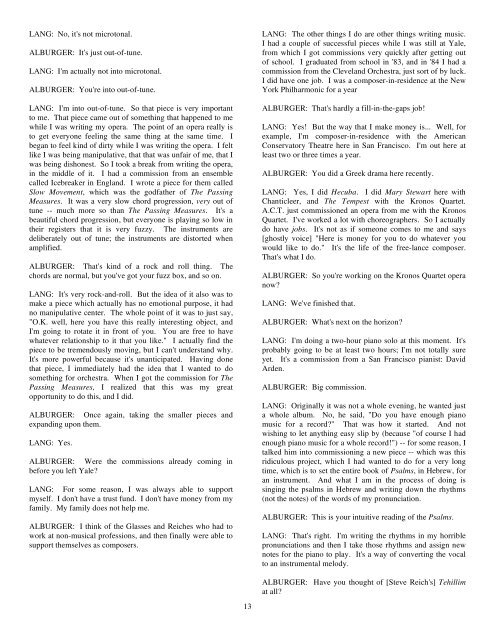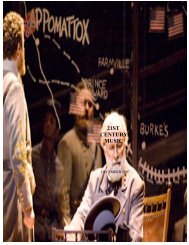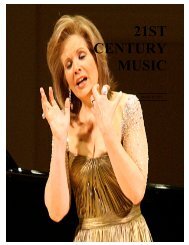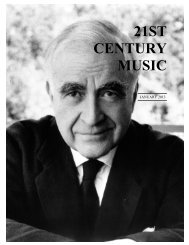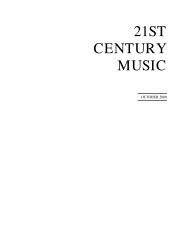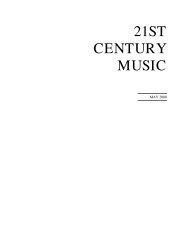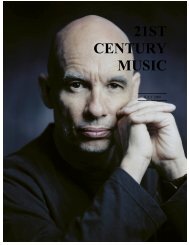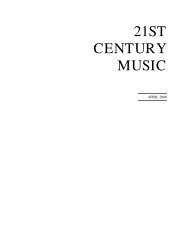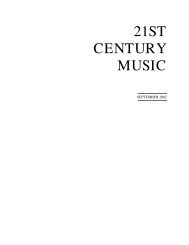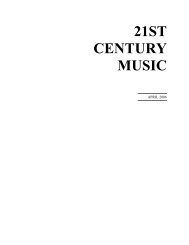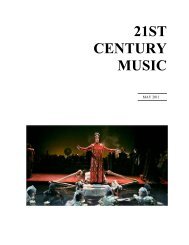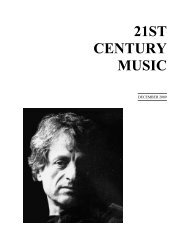You also want an ePaper? Increase the reach of your titles
YUMPU automatically turns print PDFs into web optimized ePapers that Google loves.
LANG: No, it's not microtonal.<br />
ALBURGER: It's just out-of-tune.<br />
LANG: I'm actually not into microtonal.<br />
ALBURGER: You're into out-of-tune.<br />
LANG: I'm into out-of-tune. So that piece is very important<br />
to me. That piece came out of something that happened to me<br />
while I was writing my opera. The point of an opera really is<br />
to get everyone feeling the same thing at the same time. I<br />
began to feel kind of dirty while I was writing the opera. I felt<br />
like I was being manipulative, that that was unfair of me, that I<br />
was being dishonest. So I took a break from writing the opera,<br />
in the middle of it. I had a commission from an ensemble<br />
called Icebreaker in England. I wrote a piece for them called<br />
Slow Movement, which was the godfather of The Passing<br />
Measures. It was a very slow chord progression, very out of<br />
tune -- much more so than The Passing Measures. It's a<br />
beautiful chord progression, but everyone is playing so low in<br />
their registers that it is very fuzzy. The instruments are<br />
deliberately out of tune; the instruments are distorted when<br />
amplified.<br />
ALBURGER: That's kind of a rock and roll thing. The<br />
chords are normal, but you've got your fuzz box, and so on.<br />
LANG: It's very rock-and-roll. But the idea of it also was to<br />
make a piece which actually has no emotional purpose, it had<br />
no manipulative center. The whole point of it was to just say,<br />
"O.K. well, here you have this really interesting object, and<br />
I'm going to rotate it in front of you. You are free to have<br />
whatever relationship to it that you like." I actually find the<br />
piece to be tremendously moving, but I can't understand why.<br />
It's more powerful because it's unanticipated. Having done<br />
that piece, I immediately had the idea that I wanted to do<br />
something for orchestra. When I got the commission for The<br />
Passing Measures, I realized that this was my great<br />
opportunity to do this, and I did.<br />
ALBURGER: Once again, taking the smaller pieces and<br />
expanding upon them.<br />
LANG: Yes.<br />
ALBURGER: Were the commissions already coming in<br />
before you left Yale<br />
LANG: For some reason, I was always able to support<br />
myself. I don't have a trust fund. I don't have money from my<br />
family. My family does not help me.<br />
ALBURGER: I think of the Glasses and Reiches who had to<br />
work at non-musical professions, and then finally were able to<br />
support themselves as composers.<br />
LANG: The other things I do are other things writing music.<br />
I had a couple of successful pieces while I was still at Yale,<br />
from which I got commissions very quickly after getting out<br />
of school. I graduated from school in '83, and in '84 I had a<br />
commission from the Cleveland Orchestra, just sort of by luck.<br />
I did have one job. I was a composer-in-residence at the New<br />
York Philharmonic for a year<br />
ALBURGER: That's hardly a fill-in-the-gaps job!<br />
LANG: Yes! But the way that I make money is... Well, for<br />
example, I'm composer-in-residence with the American<br />
Conservatory Theatre here in San Francisco. I'm out here at<br />
least two or three times a year.<br />
ALBURGER: You did a Greek drama here recently.<br />
LANG: Yes, I did Hecuba. I did Mary Stewart here with<br />
Chanticleer, and The Tempest with the Kronos Quartet.<br />
A.C.T. just commissioned an opera from me with the Kronos<br />
Quartet. I've worked a lot with choreographers. So I actually<br />
do have jobs. It's not as if someone comes to me and says<br />
[ghostly voice] "Here is money for you to do whatever you<br />
would like to do." It's the life of the free-lance composer.<br />
That's what I do.<br />
ALBURGER: So you're working on the Kronos Quartet opera<br />
now<br />
LANG: We've finished that.<br />
ALBURGER: What's next on the horizon<br />
LANG: I'm doing a two-hour piano solo at this moment. It's<br />
probably going to be at least two hours; I'm not totally sure<br />
yet. It's a commission from a San Francisco pianist: David<br />
Arden.<br />
ALBURGER: Big commission.<br />
LANG: Originally it was not a whole evening, he wanted just<br />
a whole album. No, he said, "Do you have enough piano<br />
music for a record" That was how it started. And not<br />
wishing to let anything easy slip by (because "of course I had<br />
enough piano music for a whole record!") -- for some reason, I<br />
talked him into commissioning a new piece -- which was this<br />
ridiculous project, which I had wanted to do for a very long<br />
time, which is to set the entire book of Psalms, in Hebrew, for<br />
an instrument. And what I am in the process of doing is<br />
singing the psalms in Hebrew and writing down the rhythms<br />
(not the notes) of the words of my pronunciation.<br />
ALBURGER: This is your intuitive reading of the Psalms.<br />
LANG: That's right. I'm writing the rhythms in my horrible<br />
pronunciations and then I take those rhythms and assign new<br />
notes for the piano to play. It's a way of converting the vocal<br />
to an instrumental melody.<br />
ALBURGER: Have you thought of [Steve Reich's] Tehillim<br />
at all<br />
13


